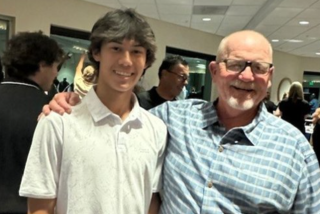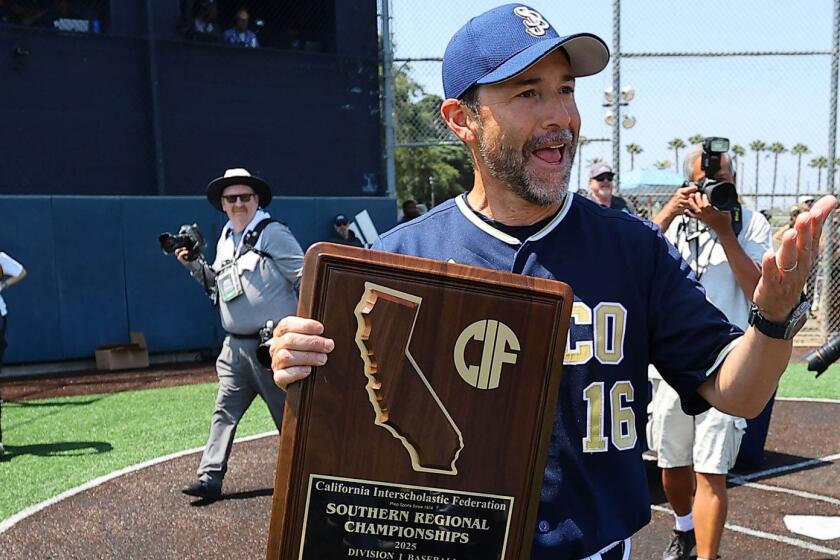Fiery Attitude Helps Coach Cope With Illness : Prep football: Henry Pacheco, who spent the past 12 seasons at San Pedro High, has been battling leukemia.
- Share via
In his 12 years as a football coach at San Pedro High, Henry Pacheco was known as a fighter.
His motto was, “Practice what you preach,” and he taught his players never to quit.
That attitude helped save his life.
After Pacheco was released as San Pedro’s coach last February, he began experiencing flu-like symptoms, even as he searched for another coaching job.
Finally, on May 15, Pacheco went to the Kaiser Permanente Medical Center’s emergency room in Harbor City because of a severe sore throat. There, a blood test revealed that his white-cell count was abnormally high. His condition later was diagnosed as acute lymphocytic leukemia.
He has been hospitalized ever since.
For the last six months, Pacheco has battled the blood cancer that mainly affects children. At 48, his chances for a quick recovery were not good, but he underwent treatment that included transfusions, chemotherapy and steroids.
“When I first found out, it was very devastating because I had always been so active and had never been sick,” Pacheco said. “I figured that it can’t be true, but before I knew it I was getting chemo treatment and things changed very quickly.”
The 6-foot, 235-pound coach lost more than 50 pounds once his treatment started. He also lost his stamina and was severely tested when he was put in isolation as a precaution against other diseases.
“Henry has always been a big guy and seeing him weak affected the family,” said Robert Pacheco, one of Henry’s nine brothers and three sisters. “He turned out to be more of a strength to the family because he was very, very positive. He always said that he would get over this.”
Leukemia affects the white blood cells, which protect the body from infection. Acute lymphocytic leukemia affects white blood cells that are produced in the lymph glands, and most often appears in children.
About half the children who receive treatment survive for at least five years, some for much longer, according to the American Medical Assn.’s Family Medical Guide.
“I didn’t know what to think, like how long this would last or what,” Pacheco said. “I had to learn all about the disease because no one in my family or who I knew ever had it.
“It is human nature to have doubt about your recovery and I am no different. Death crosses your mind, but you try not to think about it and you just have to do a lot of prayer.”
After months of treatment, Pacheco did not show much improvement. It was decided in late September that he would undergo bone marrow transplant surgery, with Robert as his donor.
Pacheco has responded well to that. His blood count is up, he has regained weight and some of his mobility, and doctors like his chances for recovery. In fact, he may be able to go home next week.
Once home, Pacheco will still be shielded from bacteria, with only close family members allowed to visit. But his family and friends are excited.
“We have all been pulling for him,” said Mike Walsh, who coached with Pacheco for 10 years before replacing him as coach in January. “He is a very fiery competitor and if anyone can whip this disease, he is the one. He has always dealt with life with gusto.”
Robert Pacheco said: “We all know that this is not the last hurdle, but the entire family is behind him.”
One of Henry’s older brothers, Saul, the athletic director at Carson High, says that the community has rallied behind his brother.
“I coached at Carson for many years and the kids on this year’s team decided to dedicate their game against San Pedro to my brother,” Saul said. “It was their way of doing something through me for him.”
Football has long played a major role in Henry Pacheco’s life, but its importance has changed.
“In almost 20 years, this has been my first season without football,” he said. “I always realized that football was just a game, but now it’s even in a different perspective. I know that there is more to life and I think more positive about things. My priorities have changed.
“Maybe I will not be able to coach anymore, but I would like to do something with sports because it has been a big part of my life. I would like to be completely recovered in five years.
“I would like to thank everybody for all of their support. Especially all of the coaches who have sent messages. Just let them know that I shall be back.”
More to Read
Get our high school sports newsletter
Prep Rally is devoted to the SoCal high school sports experience, bringing you scores, stories and a behind-the-scenes look at what makes prep sports so popular.
You may occasionally receive promotional content from the Los Angeles Times.






